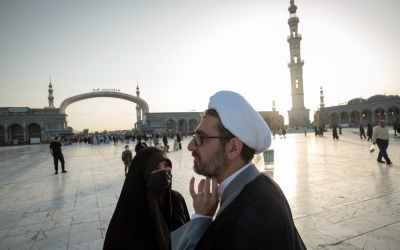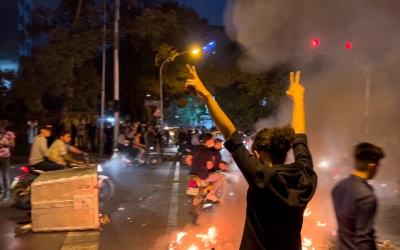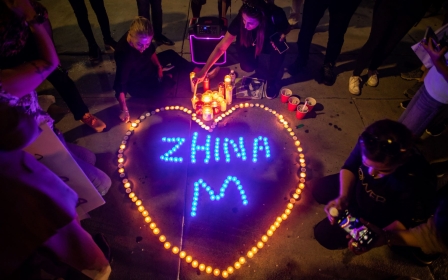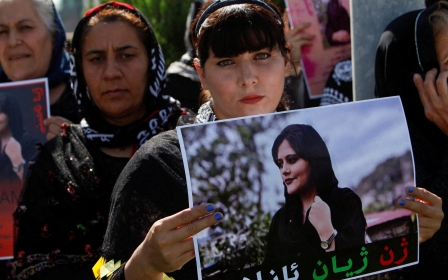Mahsa Amini: How Iran's 'Asian Maradona' backed protesters and enraged the authorities
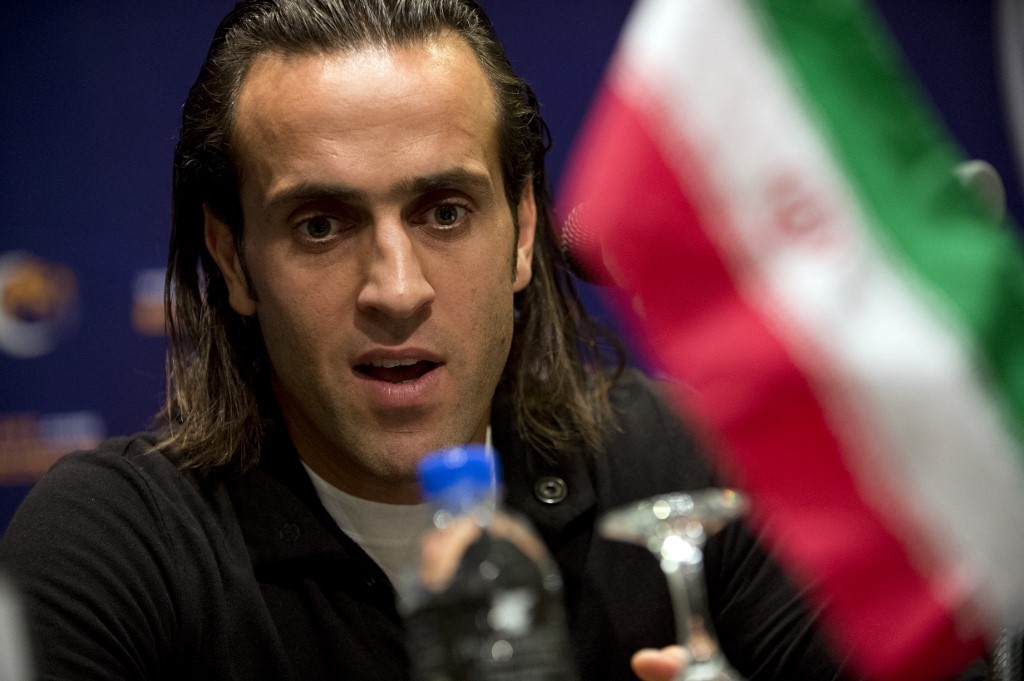
Unlike previous major protests in Iran, many prominent Iranians have added their voices of support to those demonstrating over the death of Mahsa Amini, often at their own risk. One name has particularly stood out: Ali Karimi, a national icon often called the greatest Iranian footballer of all time.
Nicknamed “the Magician” or the "Asian Maradona", Karimi, who played for Persepolis in Tehran before plying his trade in Europe at Schalke and Bayern Munich - winning 127 international caps along the way - the retired player has shocked the Islamic Republic with his vociferous political support for the protests.
New MEE newsletter: Jerusalem Dispatch
Sign up to get the latest insights and analysis on Israel-Palestine, alongside Turkey Unpacked and other MEE newsletters
He has very publicly joined the protests and even used his social network accounts to advise his millions of followers how to avoid arrest by the security services.
“Don’t [damage] the banks. Don’t [harm] women who observe hijab. Don’t [insult] the Quran," Karimi tweeted on 22 September.
"Don’t do anything to those who don’t accompany you in the protests. You shouldn’t follow whoever did such things which are part of their [trap] against you dear people of me.”
He even once asked the army to enter the streets to protect people from being killed by the security services (in Iran, many see the “army” as the national military, rather than the Islamic Revolutionary Guard Corps, which is the bulwark of the ruling establishment).
This is not the first time Karimi has engaged with protests and social movements in Iran. In 2009, when people poured onto the streets in protest over ballots that were alleged to have been rigged against reformist Mir-Hossein Mousavi of the Green Movement, Karimi showed his support by wearing a green wristband during an important qualifying match for the 2010 World Cup against South Korea.
Despite official warnings, Karimi refused to remove the wristband.
Slamming the government
Since principalist President Ebrahim Raisi took office in August 2021, Karimi has become even more vocal, slamming the government and supporting protesters' different demands.
A few months ago, Karimi stated that instead of the traditional donations of food on Muharram, which marks the start of the Islamic calendar, the money could be spent on poor people’s treatment in hospitals. This led one hardline cleric to curse Karimi in a speech.
Additionally, the principalist-dominated municipality of Tehran removed all advertisements in the city featuring Karimi’s image.
But it was the death of Amini last month, allegedly at the hands of the so-called "morality police" enforcing Iran's strict hijab law, which really propelled Karimi into the activist spotlight, with some even claiming that the former football legend is the figurehead of the protests, which are known to be leaderless.
It was the death of Amini last month that propelled Karimi into the activist spotlight, with some even claiming that the former football legend is the figurehead of the protests
Before the protests over Amini's death, Karimi had around 40,000 followers on Twitter. Now he has more than 800,000. On Instagram, his followers have increased from eight million to 12 million in less than three weeks.
Republican Guard-affiliated Fars news agency recently launched a campaign in which nearly 100,000 of its viewers demanded that the government punish Karimi. Karimi posted news of the campaign on his Twitter account and held a survey to solicit the opinion of his followers. More than 700,000 people declared that they agreed with Karimi's views on the protests.
Moreover, Hamid Rasaei, a former hardline MP, stated in a live television interview that Karimi's property should be confiscated for causing chaos in the country. Shortly afterwards, a video was published on social networks, showing Karimi’s house in Tehran being confiscated by the judiciary. However, the judiciary later denied that the former player’s house has been confiscated.
Some reports suggest that Karimi has left the country, which is why the government hasn’t been able to stop him.
'Karimi has been amazing'
Speaking about the protests, a political commentator who didn’t want his name to be disclosed, told Middle East Eye: “I guess the issue is way beyond Ali Karimi. Of course, he is an important person who is passionately contributing to the protests given that he has 12 million followers. This is significant as modern movements are firstly taking shape on social networks.
“Hardliners are pointing the finger at Ali Karimi to reduce the protests to one person, while this is an unprecedented feminist movement.”
The commentator continued: “Ali Karimi has been amazing. He has been constantly tweeting and posting stories for protesters without fear. His bravery resulted in other celebrities joining the wave, which is totally unprecedented. That is why Karimi has been a necessary and inseparable part of the new movement.”
Speaking on condition of anonymity, a sociologist told MEE: “The main drivers of current protests in Iran are cyberspace and what we are witnessing on the streets, not Ali Karimi. That is why the protests will continue. The only way to change the situation is by the senior officials of the country submitting to the demands of protesters.”
He added: “The state has crushed and intimidated most influential social and political figures to be silent. That has paved the way for an outspoken figure like Karimi to fill that vacuum."
Initially, as the protests turned violent and images of the repression of protesters by security forces emerged on social networks, celebrities joined in with the protests, following in the footsteps of Karimi. Yet, this has proved highly costly for them.
Many artists and footballers have found themselves summoned to the security services' offices. Katayoun Riahi, a famous actress who released a picture of herself not wearing a hijab in solidarity with the protests, has seemingly been on the run since security forces raided her home to arrest her.
Others weren’t so lucky. Footballers Hossein Mahini and Hamidreza Aliasgari were both detained following their support for the protests. The former has reportedly been sent to the notorious Evin Prison.
'State wants to intimidate celebrities'
Mehran Modiri, a popular comedian, had his passport confiscated after returning to Iran from a short trip to the UAE. Modiri had called on officials to end their violent behaviour towards people and stated that he didn’t want state TV to broadcast even a “frame” of his shows anymore.
Ali Daei, arguably the most famous Iranian footballer of all time, also had his passport confiscated by government officials following his support for the protests.
The government-run IRNA news agency also reported that an arrest warrant for the popular actor Hamed Behdad had been issued. Besides his repeated declaration of support for the protesters and criticism of the security forces, he had also wished for the death of Raisi's culture minister.
“The state wants to intimidate celebrities by arresting them and taking a hard line on them. They are signalling to celebrities that you might be next if you keep supporting the protests," a political journalist, who didn’t want his name disclosed, told MEE.
"In fact, the state is fully aware of celebrities’ influence, especially over Iran's Generation Z. That’s why they seek to silence them."
Middle East Eye delivers independent and unrivalled coverage and analysis of the Middle East, North Africa and beyond. To learn more about republishing this content and the associated fees, please fill out this form. More about MEE can be found here.


